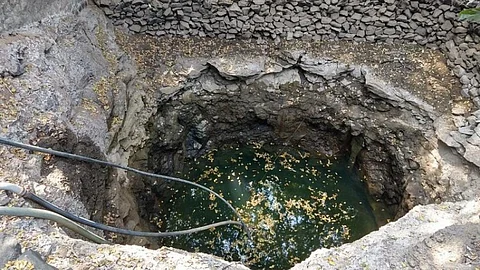
- Topics
- Feature
- Opportunities & Events
- About
- Hindi Portal
- Data
- Topics
- Feature
- Opportunities & Events
- About
- Hindi Portal
- Data

Finding no merit in CGWA’s plea that stringent curbs on groundwater use will have an adverse impact on industrial production, employment opportunities and the economy of some states, the National Green Tribunal (NGT) has banned granting general permissions for withdrawal of groundwater especially to commercial entities. Instead, an environmental impact assessment (EIA) will be carried out to grant such permissions to these entities. The order is going to put nearly 20,000 applications seeking no-objection certificates from the industry on hold. Along with this, the NGT has also directed authorities to conduct water mapping of all overexploited, critical and semi-critical (OCS) assessment units based on which water management plans need to be prepared. (Livemint)
The Yamuna Monitoring Committee, appointed by the National Green Tribunal, has recommended revisiting the 1994 Yamuna water sharing agreement between Uttarakhand, Himachal Pradesh, Uttar Pradesh, Haryana and Delhi. The aim behind the recommendation is to maintain environmental flows in the Yamuna river throughout the year and permit release of the recommended E-flow at Hathnikund Barrage. Along with this, the committee has also sought a report from the Central Pollution Control Board, Delhi Pollution Control Committee and Industries Commissioner about the reasons behind "sudden froth" in the river. It has also directed the authorities to take prompt action to detect the source of froth in the river and act against those responsible. (NDTV, Zee News)
In a monthly progress report to the National Mission for Clean Ganga (NMCG), the state government has informed that the Irrigation and Water Resources Department, UP has prepared a plan for environmental flow studies of six perennial polluted rivers in the state. The six river stretches are those of the Saryu, Hindon, Ramganga, Betwa, Ghaghara and Rapti rivers. So far, Ganga is the only river in the country for which E-flow, the minimum limit of flow required to maintain a river in the desired environmental state, has been fixed by the Centre. E-flow will be fixed for Hindon between Saharanpur and Ghaziabad, for Saryu between Ayodhya and Elafatganj and for Ramganga the plan is to fix e-flow from Moradabad to Kannauj. (The Indian Express)
The Krishna River Management Board (KRMB) has approved a total of 54.67 tmc ft of Krishna river water for utilisation by Telangana and Andhra Pradesh till the end of August from two common sources – Srisailam and Nagarjunasagar reservoirs. Out of this, 17 tmc ft has been approved to Andhra Pradesh while 35.67 tmc ft has been approved to Telangana. The quantities approved for the two states include the water already availed from June 1. However, the Engineers-in-Chief (ENCs) of Andhra Pradesh did not agree for the request of Telangana ENC to carry forward its savings and unutilised share of water allocated in the previous year. (The Hindu)
Under the Southern Boundary Road-Cum-Highland Management Plan, the Assam forest department has sought around Rs 12 crore from the Centre to convert 32 km road at Kaziranga into highlands. The structures, which will come up in view of the frequency of high floods in recent years, will be constructed in such a manner so as to not hamper the flow of water into the park. Earlier to escape the flood fury, the animals would migrate to the adjoining Karbi Anglong hills. However, the construction of lodging facilities for tourists and stone quarries along the border areas have blocked many of the animal corridors. (The Times of India)
This is a roundup of important policy matters from July 21 - August 9, 2020. Also, read news this week.